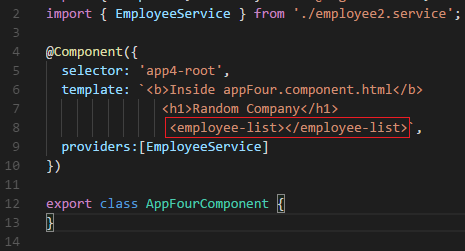I'm learning Angular looking for help in fixing the error: I'm following this link : https://github.com/angular/angularfire2/blob/master/docs/install-and-setup.md to create a angular small app with angular2 and angularfirestore2
but when I hit ng serve I am getting the below error in browser console..
StaticInjectorError[AngularFirestore]:
StaticInjectorError[AngularFirestore]:
NullInjectorError: No provider for AngularFirestore!
at _NullInjector.get (core.js:923)
at resolveToken (core.js:1211)
at tryResolveToken (core.js:1153)
at StaticInjector.get (core.js:1024)
at resolveToken (core.js:1211)
at tryResolveToken (core.js:1153)
at StaticInjector.get (core.js:1024)
at resolveNgModuleDep (core.js:10585)
at NgModuleRef_.get (core.js:11806)
at resolveDep (core.js:12302)
I tried googling it but didn't find the exact solution nothing worked for me :(,
Here is what I followed: 1) Installed Node Version 8.9.1 2) npm install -g @angular/cli --> Version 1.5.2 3) ng new 'project-name' 4) npm install angularfire2 firebase --save
Here are my app.module.ts file:
import { BrowserModule } from '@angular/platform-browser';
import { NgModule } from '@angular/core';
import { AppComponent } from './app.component';
import { AngularFireModule } from 'angularfire2';
import { environment } from '../environments/environment';
@NgModule({
imports: [
BrowserModule,
AngularFireModule.initializeApp(environment.firebase)
],
declarations: [ AppComponent ],
bootstrap: [ AppComponent ]
})
export class AppModule {}
app.component.ts:
import { Component } from '@angular/core';
import { AngularFirestore } from 'angularfire2/firestore';
import { Observable } from 'rxjs/Observable';
@Component({
selector: 'app-root',
templateUrl: './app.component.html',
styleUrls: ['./app.component.css']
})
export class AppComponent {
title = 'app';
constructor(db: AngularFirestore) {}
}
environemnt.ts:
export const environment = {
production: false,
firebase: {
apiKey: 'xxxxx',
authDomain: 'aaaaaaa',
databaseURL: 'bbbbbbbbbbbbbbbbbb',
projectId: 'aaaaaaaaaaaaaa',
storageBucket: 'aaaaaaaaaaaa',
messagingSenderId: 'aaaaaaaaaaaaa'
}
};
then ng serve, and I am getting the above error...


